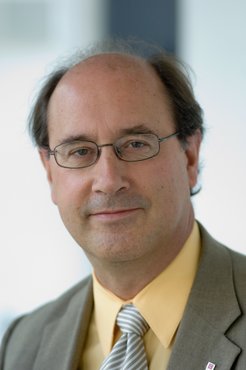Professor Bernard Schutz receives an honorary doctorate from the University of Glasgow
The University of Glasgow will bestow the title of Honorary Doctor on Professor Bernard Schutz on 30 June 2011 in recognition of his vital and internationally recognised contributions to theoretical astrophysics.
Professor Bernard Schutz has played a major part in developing fruitful collaborations between theoretical and experimental astrophysicists worldwide, particularly in the field of gravitational wave detection. Gravitational waves – ripples in the fabric of spacetime – are a prediction of Einsteinʼs General Theory of Relativity, and are expected to be emitted in violent astrophysical events such as the coalescence of two black holes. They have not yet been observed, but their detection would open up a completely new and powerful field of observational astronomy. Large-scale gravitational wave detectors – GEO600, LIGO and Virgo (and the future space observatory LISA) – are now on the brink of ʻhearingʼ these waves. Professor Schutz was one of the key scientists who created the underpinning field of gravitational wave theory.

"Receiving an Honorary Doctor of Science from the University of Glasgow is a very special distinction for me. It also underscores the importance of theoretical astrophysics in the field of gravitational wave astronomy", said Professor Schutz. "Only through tight cooperation between theoreticians and experimentalists will we ever be able to find direct proof of Einstein's gravitational waves and so lay the foundations of a new hearing astronomy' – listening to the sounds of spacetime - to complement the more conventional 'seeing astronomy'. I have a long history of cooperation with colleagues in Glasgow", Professor Schutz added. "For instance, the GEO600 gravitational wave observatory is jointly run by us.” Prof Sheila Rowan, Director of the Institute for Gravitational Research said “in Glasgow we have had a long and extremely fruitful history of working with Bernard and are delighted to see his contributions recognised in this way”.
Professor Schutz studied physics at Clarkson University in Potsdam, New York. He earned his degree there in 1967 followed by his PhD at the California Institute of Technology (Caltech) in Pasadena, CA in 1971. There, gravitational wave research was already becoming a hot topic, and he found himself strongly drawn to it. Since then, Professor Schutz has specialised in theoretical research on the applications of General Relativity to astrophysics. Because of this work, which included calculations of gravitational wave signals and the development of methods for analysing the data from gravitational wave detectors, Professor Schutz has become internationally acknowledged as one of the leading experts in the field of General Relativity.
As a founding director of the Max Planck Institute for Gravitational Physics (Albert Einstein Institute) in Potsdam, Germany (together with Professor Jürgen Ehlers), Professor Schutz has made crucial contributions to revitalising General Relativity research in Germany. He is director of the institute's Astrophysical Relativity research team, which uses supercomputers to carry out simulations of General Relativity and black holes, and also to analyse the data coming from the worldwide net of gravitational wave detectors. Additionally, Professor Schutz has retained his chair at the School of Physics and Astronomy at the University of Cardiff in Wales, where he had been teaching before moving to Germany. He is also an honorary professor at the Leibniz Universität in Hannover, and at the University of Potsdam in Germany. Professor Schutz is a member of the Leopoldina, the German national academy of science, and honorary fellow of the Royal Astronomical Society. In May 2011, he was elected a fellow of the Learned Society of Wales – the Welsh Academy of Science.










